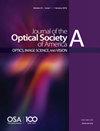色度感应是诱导刺激波长的函数。
引用次数: 12
摘要
在460 ~ 680 nm的单色、等亮度诱导刺激下,采用色差消除法测定了诱导色差效应。观察到的红绿和黄蓝诱导的色彩反应函数与基于对立色假设的预测不同,可以准确地解释同时色彩对比效应的特征。采用R和G锥线性组合的红-绿函数和采用R和B锥线性组合的黄-蓝函数均获得了良好的线性拟合。这些发现表明,颜色对比的对手机制可能不同于同质色的对手机制。本文章由计算机程序翻译,如有差异,请以英文原文为准。
Chromatic induction as a function of wavelength of inducing stimulus.
Induced chromatic effects were determined for monochromatic, equal-luminance inducing stimuli from 460 to 680 nm by using a hue-cancellation procedure. The observed red-green-and yellow-blue-induced chromatic-response functions, which were different from the prediction based on the opponent-color hypothesis, could accurately explain the characteristics of the simultaneous color contrast effect. Good linear fits were obtained for the red-green function with a linear combination of R and G cones and for the yellow-blue function with a linear combination of R and B cones. These findings suggest that the opponent mechanisms for color contrast may be different from those for homogeneous color.
求助全文
通过发布文献求助,成功后即可免费获取论文全文。
去求助
来源期刊
自引率
0.00%
发文量
0
期刊介绍:
OSA was published by The Optical Society from January 1917 to December 1983 before dividing into JOSA A: Optics and Image Science and JOSA B: Optical Physics in 1984.

 求助内容:
求助内容: 应助结果提醒方式:
应助结果提醒方式:


